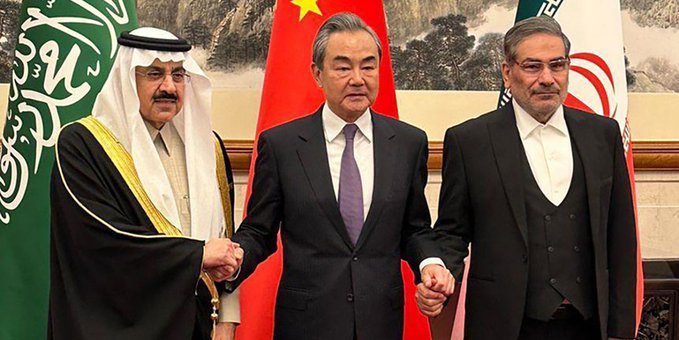David Finkel
Posted March 20, 2023

SUCH A TOUCHING reconciliation: The foreign ministers of Saudi Arabia, land of mass executions and kidnap–dismemberment of the dissident Jamal Khashoggi, and Iran, home of the “morality police” murder of Mahsa Amini and a regime in all-out war against its population, brought together through the good offices of the Chinese Foreign Ministry.
It’s not exactly a brotherly embrace – rather, the pose of “normalization” is a symbolic linkage by way of Chinese diplomacy. Iran and Saudi Arabia are resuming relations that broke off in 2016 after Saudi Arabia executed a leading Shia cleric and an Iranian mob stormed the Saudi embassy. The deeper enmity goes back to the 1979 Iranian revolution.
There’s no trust between the two regimes farther than they can throw each other, but in the shifting regional political and economic sands they have higher priorities than continuing their long-running quarrels. In brief, the crisis-ridden Iranian regime needs to break out of its enforced global isolation; Saudi Arabia needs diplomatic muscle and leverage in pursuing a deal with the United States and Israel; and importantly, both of them are looking to Chinese investment for their economic development.
There is one undoubtedly positive potential result of this new diplomatic dispensation: ending a brutal war in Yemen that has killed even more people than the first year of Russia’s invasion of Ukraine. The United States arming Saudi Arabia against Iranian-backed Yemeni Houthi forces has produced an appalling civilian carnage and brought Yemen to the brink of mass starvation. If the current cease-fire can become a lasting end of hostilities, that all by itself makes the “normalization” a positive development regardless of the murderous character of the respective regimes.
The wailing and gnashing of teeth you may be hearing from U.S. militarist neocons and the embattled Netanyahu government in Israel has to do with the possibility of losing Saudi Arabia as a close partner in the war they dream of ultimately launching against Iran.
Does the Saudi regime want normalization and semi-covert partnership with Israel? Absolutely, yes – but as part of that package it wants enhanced U.S. “security guarantees” and support for a Saudi
“civilian nuclear program,” with the danger that inevitably implies for nuclear weapons development. For its part, Israel wants Saudi Arabia to be a dependent partner, not a strong player, including Saudi support for imposing Israeli terms on the Palestinian population.
Although Palestinian society may be on the verge of explosion as Israeli military and settler brutality escalates, that’s the kind of event that’s inherently unpredictable. (And the grim reality is that Palestinians have no meaningful allies among global or regional states, despite rhetoric from assorted regimes and toothless ritual United Nations resolutions.)
New Uncertainties
The broader question for “geopolitical” analysts and media pundits is how important China’s diplomatic breakthrough may be in enhancing its presence at the expense of the United States’ entrenched domination of the Middle East.
As a moment in the deepening U.S.-China imperial rivalry, brokering Saudi-Iranian normalization is undoubtedly significant for Chinese influence. Elite opinion seems divided over whether this is a signal event in a long term “Chinese rise” and “U.S. decline.”
Frankly there are good reasons for the uncertainty. Obviously, the United States has been weakened by plenty of self-inflicted damage: the ruinous invasion and occupation of Iraq, which opened up the rise of Iran’s strength from Iraq through Syria to Lebanon; Donald Trump unilaterally trashing the multinational Iran nuclear deal; and the four-decade bipartisan U.S. debacle in Afghanistan, culminating in Joe Biden carrying out the withdrawal deal that Trump made with the Taliban over the heads of the Afghan government (which we were supposedly protecting).
All this and more certainly opened the door for China to build stronger relations in the Middle East — in line with its broad global ambitions in Asia, Africa and Latin America. On the other hand, China itself faces big economic problems and requires, if anything, tamping down rather than escalating its tensions with the United States.
At the same time, Russia’s debilitating quagmire in Ukraine affects China negatively – it cannot afford to see its Russian partner (now a junior partner) decisively defeated, but also cannot afford the kind of confrontation with the West that overt military support to Russia would risk. If China could broker a deal between Russia and Ukraine, that would be quite something – but it’s a distant prospect at best.
As for U.S.-China relations, the somewhat comical “weather balloon” episode is no bigger an incident than what both sides decide to make it. More important tensions will persist, including Chinese “political interference” and U.S. efforts to block Chinese access to critical technology – where each side tends to tell the truth about the other’s actions while lying about its own – because this is a very real deep-rooted imperial rivalry. It doesn’t necessarily mean that one or the other is definitively winning.
We are left with uncertainty about the global power significance of the Iranian-Saudi normalization. If it holds, we can hope that it brings relief to the horrific suffering of the Yemeni people. As for the ordinary citizens of Iran and Saudi Arabia living under vicious repression, they will gain nothing from it – nor will the Palestinian people, whose aspirations for freedom and self-determination are collateral damage in every international crisis.
Winning freedom, and removing the threats of war, requires a democratic, revolutionary transformation and the overthrow of all imperialist domination.

Comments
One response to “Iran-Saudi Arabia “Normalization”: Beijing In, Washington Out?”
Good statement